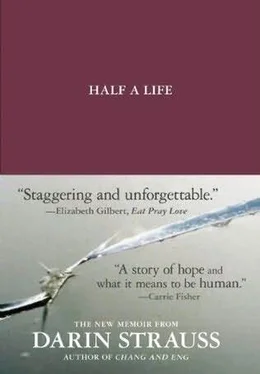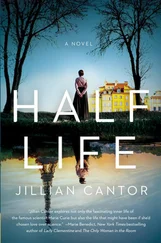Amy Hempel has a story, “In the Cemetery Where Al Jolson Is Buried.” I read it a few years after college, and then read it again from the beginning immediately after I’d finished. Early and in passing, the narrator tells a very sick friend about a chimp whom someone had taught sign language. The story doesn’t analyze sadness so much as prod it and poke at it. Near the end, the sick friend dies and the story goes out like this, once the narrator is left alone:
I think [back to] the chimp, the one with the talking hands.
In the course of the experiment, that chimp had a baby. Imagine how her trainers must have thrilled when the mother, without prompting, began to sign to her newborn.
Baby, drink milk.
Baby, play ball.
And when the baby died, the mother stood over the body, her wrinkled hands moving with animal grace, forming again and again the words: Baby, come hug, Baby, come hug, fluent now in the language of grief.
“Bear your griefs yourself …”
— As You Like It
For years, the court case just dragged its slow length along. Nothing lawsuit-related would be going on, then I’d get word of a coming deposition — which then for some reason would be postponed, indefinitely. It seemed random, like when a dark sky decides not to rain. But even as our case would disappear around a corner, I could sense it wending its way — spreading its shadow, big and cold, inside the parts of me where Celine still was.
My old friend Jim attended Boston University, not far from Tufts. I could talk accident stuff to Jim, because he already knew. It was a bit of social math; I couldn’t lose anything by it, because the crash already shaped how he saw me.
All the same, I talked to him about it exactly once.
Sophomore year and Christmastime. I was nineteen. Jim and I waited together at Logan airport for a flight home. I admitted, or tried to admit, that the painful fact of Celine’s parents being out there, someplace, just seething, hating me, blaming me for their daughter’s death, made me just … made me just …
How could I put words to the thick, gloomy thing that covered my mind — this nullity that even all these years later, when I call up that airport confession, makes it all play a little extra darkly in my brain’s theater? This was the same pain, the same whole-soul despair, that got me thinking — mainly theoretically, in an informal way — about committing suicide.
I felt in contact with the Zilkes’ hate, a long-distance communication between us, like a dispatch sent over telephone wire: a future, a jinx, message received. This silent communication with the Zilkes felt like the truest words anyone had said to me since the accident. The only unmuffled thing — what I’d waited to hear the whole time. You did this. You alone are responsible .
I didn’t cry when talking about this to Jim. I just felt very, very sad. Tears came quickly and readily at movies — even the dumbest movies — and at commercials. (Even the most obvious: family gatherings, a new mayonnaise sampled at an outdoor table, or an affordable phone service — and I found myself reaching for the Kleenex. A man and woman taking each other’s arms after leaving an especially understanding slow-motion bank, walking down a moody, populated street with smiles on their faces, and I was a puddle.) But I never cried about things in my own life. They seemed too small. And I never cried about Celine.
Jim listened carefully as I chattered on about the Zilkes. Holiday passengers circulated around, their belongings on stands and wheels: the flustered, the ardent, the frowning, the greeters and the greeted, the intersections of lives and plans at an airport.
“What dicks they are,” Jim said.
My thought was— no! “I think her parents just don’t have any idea what to do,” I said. How would he act in their place?
Jim shook his head no. He put his hand on my biceps; I could feel the fingers through the wool. College was teaching all of us not to be so shy about touching, that contact was what adults did more of than children.
“Darin, dude, everyone knows how you feel. Don’t beat yourself up. Her parents are already willing to beat you up for you,” he said. “Those dicks.”
I gave a small, gutless laugh and changed the subject. I very badly wanted to stand up for the Zilkes but didn’t even try.
And then I was twenty and not talking about it at all, not even to people like Jim. That year I remember as one peeled of emotion. I didn’t identify with the Zilkes’ anger anymore. I really wasn’t feeling at all, just finishing classes, closing books and subjects forever.
I belonged to no support groups, but still I somehow fell into the serenity now traps of rationalization and cop-out. It was easy to do. I had, of course, that journal entry. I think we all build superstructures in our heads, catwalks and trestles that lead us from the acceptance of our own responsibility to the cool mechanics of the factory, where things are an interlocking mess, where everybody’s pretty much unaccountable. To be alive is to find a way to blame someone else.
At twenty-one I was studying in London, where avoidance was even easier. An ocean between me and the person who had done this.
Turning up a collar to Leicester Square fog, swigging one-pound lagers in fireplace pubs — these were just a very few of the uncountable experiences that Celine would never have. Every time I realized this (which was often) it came as a numbness that seemed to match the London weather: as though Celine was merely some girl I’d vaguely known in high school with very bad luck. I remember walking alone down British streets that directed everyone to Look Right, Look Left. This simple pavement advisory struck me, for pretty obvious reasons, as buzzing with whole realms of meaning.
The lawsuit still loomed over me. But I had Celine’s journal entry. I relied on assumptions I made about it. The assumptions seemed burnished and solid, and I wouldn’t have gotten through life without them.
And now I was at the end of my early twenties, spending a year in Colorado, moving to Manhattan. A different city than Boston or London, and certainly there was a much higher voltage to New York than you feel on Long Island — even just walking around the giant metal forest in whose shadow we all lived. The strangest thing about coming to Manhattan after a life in the suburbs: it’s never really dark outside. Not ever. At any hour, there are lights in the street, cars on the road, a window bright with a person moving sleepily inside — changing a TV station, sitting down to a computer with a coffee. No matter what you’re doing in New York you’re not the only one, and the absurdity is that this movement and buzz makes you feel especially anonymous. People living too close to and too far from one another at the same time. As it was with me. Because I still told nobody, who really knew me here? How would I find out who else was like me?
My accident was the deepest part of my life, and the second-deepest was hiding it. This meant certain extra steps. Never introducing high-school friends to new friends. Never taking anyone home to Long Island. (I didn’t want my parents to learn what I still felt about the crash — and I didn’t know what it was that I felt, whether it was shame or guilt or anger. Plus, asking my family not to mention it would have started a conversation that would have left them puzzled and sad. I’m not sure if this will make sense to most readers. I think each family has a funhouse logic all its own, and in that distortion, in that delusion, all behavior can seem both perfectly normal and crazy.)
By now, the camouflage had become my skin. My friends wouldn’t want to know. Who would want to know? I certainly didn’t want to know. All I wanted was to hold my assumptions to the light, and to watch them sparkle in their facets, as all sham gemstones do.
Читать дальше









